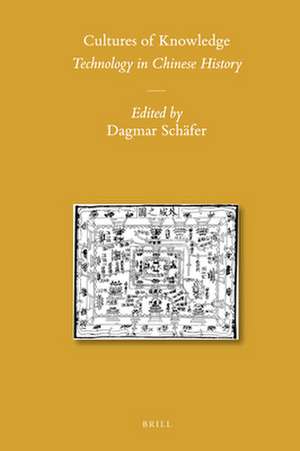Cultures of Knowledge: Technology in Chinese History: Sinica Leidensia, cartea 103
Dagmar Schäferen Limba Engleză Hardback – 13 noi 2011
Din seria Sinica Leidensia
- 18%
 Preț: 1037.13 lei
Preț: 1037.13 lei - 18%
 Preț: 902.42 lei
Preț: 902.42 lei - 18%
 Preț: 713.15 lei
Preț: 713.15 lei - 18%
 Preț: 633.41 lei
Preț: 633.41 lei - 18%
 Preț: 872.95 lei
Preț: 872.95 lei - 18%
 Preț: 622.48 lei
Preț: 622.48 lei - 18%
 Preț: 585.94 lei
Preț: 585.94 lei - 18%
 Preț: 685.20 lei
Preț: 685.20 lei - 18%
 Preț: 1358.34 lei
Preț: 1358.34 lei - 18%
 Preț: 717.19 lei
Preț: 717.19 lei - 18%
 Preț: 725.15 lei
Preț: 725.15 lei - 18%
 Preț: 579.17 lei
Preț: 579.17 lei - 18%
 Preț: 596.61 lei
Preț: 596.61 lei - 18%
 Preț: 863.67 lei
Preț: 863.67 lei - 18%
 Preț: 1218.11 lei
Preț: 1218.11 lei - 18%
 Preț: 630.83 lei
Preț: 630.83 lei - 18%
 Preț: 777.23 lei
Preț: 777.23 lei - 18%
 Preț: 601.93 lei
Preț: 601.93 lei - 18%
 Preț: 636.85 lei
Preț: 636.85 lei - 28%
 Preț: 1692.18 lei
Preț: 1692.18 lei - 18%
 Preț: 729.06 lei
Preț: 729.06 lei - 18%
 Preț: 920.39 lei
Preț: 920.39 lei - 18%
 Preț: 1262.81 lei
Preț: 1262.81 lei - 18%
 Preț: 546.39 lei
Preț: 546.39 lei -
 Preț: 329.79 lei
Preț: 329.79 lei - 18%
 Preț: 821.91 lei
Preț: 821.91 lei - 18%
 Preț: 547.54 lei
Preț: 547.54 lei -
 Preț: 336.46 lei
Preț: 336.46 lei - 18%
 Preț: 691.88 lei
Preț: 691.88 lei - 18%
 Preț: 1061.30 lei
Preț: 1061.30 lei - 18%
 Preț: 731.38 lei
Preț: 731.38 lei - 18%
 Preț: 521.28 lei
Preț: 521.28 lei - 18%
 Preț: 823.06 lei
Preț: 823.06 lei - 18%
 Preț: 758.97 lei
Preț: 758.97 lei - 18%
 Preț: 610.42 lei
Preț: 610.42 lei - 18%
 Preț: 578.85 lei
Preț: 578.85 lei - 18%
 Preț: 763.68 lei
Preț: 763.68 lei - 15%
 Preț: 518.14 lei
Preț: 518.14 lei -
 Preț: 262.01 lei
Preț: 262.01 lei - 18%
 Preț: 937.17 lei
Preț: 937.17 lei - 18%
 Preț: 635.13 lei
Preț: 635.13 lei - 18%
 Preț: 585.70 lei
Preț: 585.70 lei - 15%
 Preț: 530.25 lei
Preț: 530.25 lei - 18%
 Preț: 659.85 lei
Preț: 659.85 lei - 15%
 Preț: 525.14 lei
Preț: 525.14 lei - 18%
 Preț: 579.32 lei
Preț: 579.32 lei - 15%
 Preț: 520.22 lei
Preț: 520.22 lei - 18%
 Preț: 536.26 lei
Preț: 536.26 lei - 18%
 Preț: 705.04 lei
Preț: 705.04 lei
Preț: 868.30 lei
Preț vechi: 1058.90 lei
-18% Nou
Puncte Express: 1302
Preț estimativ în valută:
166.17€ • 171.66$ • 138.30£
166.17€ • 171.66$ • 138.30£
Carte indisponibilă temporar
Doresc să fiu notificat când acest titlu va fi disponibil:
Se trimite...
Preluare comenzi: 021 569.72.76
Specificații
ISBN-13: 9789004218444
ISBN-10: 9004218440
Pagini: 396
Dimensiuni: 160 x 240 x 25 mm
Greutate: 0.8 kg
Ediția:New.
Editura: Brill
Colecția Brill
Seria Sinica Leidensia
ISBN-10: 9004218440
Pagini: 396
Dimensiuni: 160 x 240 x 25 mm
Greutate: 0.8 kg
Ediția:New.
Editura: Brill
Colecția Brill
Seria Sinica Leidensia
Notă biografică
Dagmar Schäfer heads a Research Group at the Max Planck Institute for the History of Science. Her latest book is The Crafting of the 10,000 Things, Knowledge and Technology in Seventeenth Century China, (Chicago, University of Chicago Press, 2011).
Recenzii
"This book provides a fascinating overview of current research on technology and its transmission in China. It combines in-depth case studies concerned with the material culture of various historical periods with a comparative perspective of parallel European developments. The book presents the results of a joint research venture in a coherent and very readable manner. It is a must not only for experts in Chinese history, but for everyone who is interested in understanding how technology evolves in dependence on social, cultural and political contexts." – Professor Dr. Jürgen Renn, Executive Director, Max Planck Institute for the History of Science, Berlin, Honorary Professor, History of Science, Humboldt-University Berlin, Honorary Professor, Physics, Free University Berlin, Adjunct Professor Philosophy and Physics, Boston University
